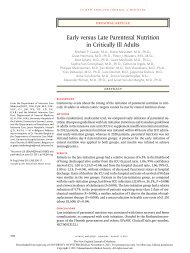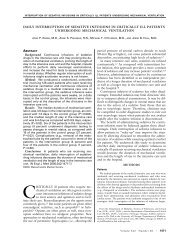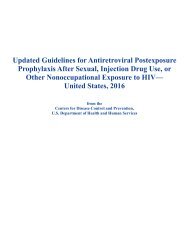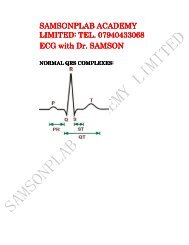ACLS Review
Create successful ePaper yourself
Turn your PDF publications into a flip-book with our unique Google optimized e-Paper software.
INTRODUCTION<br />
Congratulations! <strong>ACLS</strong> <strong>Review</strong>: Pearls of Wisdom will help you pass the Advanced Cardiac Life<br />
Support Course of the American Heart Association. This book’s unique format differs from all other<br />
review and test preparation texts. Let us begin, then, with a few words on purpose, format, and use.<br />
The primary intent of this book is to serve as a rapid review of <strong>ACLS</strong> principles and serve as a study<br />
aid to improve performance on the <strong>ACLS</strong> written and practical examinations. With this goal in mind,<br />
the text is written in rapid-fire, question/answer format. The student receives immediate gratification<br />
with a correct answer. Questions themselves often contain a “pearl” reinforced in association with the<br />
question/answer.<br />
Additional hooks are often attached to the answer in various forms, including mnemonics, evoked<br />
visual imagery, repetition, and humor. Additional information not requested in the question may be<br />
included in the answer. The same information is often sought in several different questions. Emphasis<br />
has been placed on evoking both trivia and key facts that are easily overlooked, are quickly forgotten,<br />
and yet somehow always seem to appear on <strong>ACLS</strong> exams.<br />
Many questions have answers without explanations. This is done to enhance ease of reading and rate<br />
of learning. Explanations often occur in a later question/answer. It may happen that upon reading an<br />
answer the reader may think—“Hmm, why is that?” Or, “Are you sure?” If this happens to you, GO<br />
CHECK! Truly assimilating these disparate facts into a framework of knowledge absolutely requires<br />
further reading in the surrounding concepts. Information learned, as a response to seeking an answer<br />
to a particular question is much better retained than that passively read. Take advantage of this. Use<br />
<strong>ACLS</strong> <strong>Review</strong> with your <strong>ACLS</strong> text handy and open, or, if you are reviewing on train, plane, or<br />
camelback, mark questions for further investigation.<br />
<strong>ACLS</strong> <strong>Review</strong> risks accuracy by aggressively pruning complex concepts down to the simplest kernel.<br />
The dynamic knowledge base and clinical practice of medicine is not like that! The information taken<br />
as “correct” is that indicated in the <strong>ACLS</strong> American Heart Association text. New research and practice<br />
occasionally deviates from that which likely represents the “right” answers for test purposes. In such<br />
cases we have selected the information that we believe is most likely “correct” for test purposes, which<br />
most closely conforms to the <strong>ACLS</strong> curriculum. This text is designed to maximize your score on a test.<br />
Refer to the <strong>ACLS</strong> text for further information and your mentors for direction on current practice.<br />
<strong>ACLS</strong> <strong>Review</strong> is designed to be used, not just read. It is an interactive text. Use a 3 × 5 card and cover<br />
the answers; attempt all questions. A study method we strongly recommend is oral, group study,<br />
preferably over an extended meal or pitchers. The mechanics of this method are simple and no one<br />
ever appears stupid. One person holds <strong>ACLS</strong> <strong>Review</strong>, with answers covered, and reads the question.<br />
Each person, including the reader, says “Check!” when he or she has an answer in mind. After<br />
everyone has “checked” in, someone states his or her answer. If this answer is correct, on to the next<br />
one. If not, another person states his or her answer, or the answer can be read. Usually, the person<br />
who “checks” in first gets the first shot at stating the answer. If this person is being a smarty-pants<br />
answer-hog, then others can take turns. Try it—it’s almost fun!<br />
<strong>ACLS</strong> <strong>Review</strong> is also designed to be reused several times to allow, dare we use the word, memorization.<br />
One coeditor (Plantz), a pessimist, suggests putting a check mark beside the question every time a<br />
Copyright © 2008, 2006 by The McGraw-Hill Companies, Inc. Click here for terms of use.<br />
v







